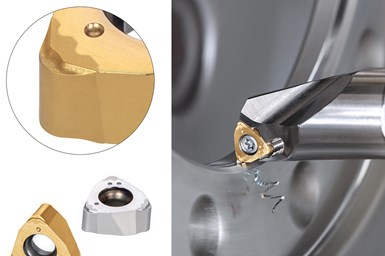Tungaloy MiniForce-Turn CBN Inserts for Hard Turning
The series offers double-sided turning inserts with positive rake cutting edges on both sides.

Tungaloy’s MiniForce Turn WavyJoint CBN insert. Photo Credit: Tungaloy
Tungaloy has added eight CBN inserts with an HP chipbreaker to its MiniForce-Turn turning insert family of double-sided positive geometry which are said to offer exceptional reliability in hard turning. The series offers double-sided turning inserts with positive rake cutting edges on both sides.
These inserts are capable of soft cutting action like that of positive inserts with an added advantage of double cutting edges, the company says. The inserts feature HP chipbreaker and use WavyJoint brazing technology for the CBN tips which are designed to provide enhanced insert reliability during hard turning.
The HP chipbreaker is said to demonstrate excellent chip control during hard turning at 0.2 mm (0.008”) or smaller depths of cut. The chipbreaker is designed with a strategical distance between the cutting edge and chip redirector. This not only inhibits crater wear development on the rake face for maximum tool life but also helps lighten cutting forces during machining, thereby eliminating chatter marks and part scraps.
The company says two CBN insert grades are available, including the general-purpose BXA20 grade which covers an application range from continuous to interrupted cuts at low to medium cutting speeds. The other is the BXA10 grade which is said to feature good wear resistance in continuous cuts of hardened steel parts, demonstrating exceptional insert reliability and long tool life.
Related Content
-
New Cutting Tool Technology Discovered at Paul Horn Open House
During a tour of the company’s campus in Tubingen, Germany, I and more than 3,000+ others were introduced to a number of new advances the company has made in cutting tool technology particularly as it relates to the medical industry.
-
Broaching Tool Technology For Lathes Used to Slot Inconel Parts
This shop finds value in using an indexable-insert-style broaching tool to create blind-hole slots in heat-treated Inconel aerospace parts on a CNC lathe.
-
The Value of Tool Monitoring on Rotary Transfer Machines
By using a tool monitoring system, shops can save costs associated with machine maintenance and downtime for tool changes while increasing cutting performance.













